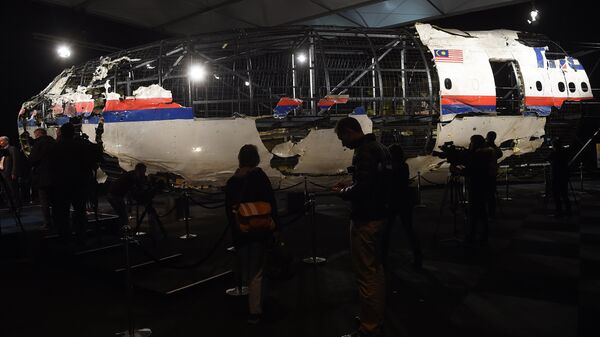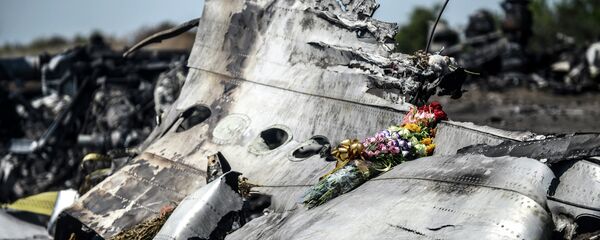"[I]f you read between the lines, you can see already they want to attach the shooting on Russia. Just have a look in mainstream media. Nobody was reporting neutrally since the beginning of the shooting of MH17," Georg Mayer said.
The Austrian lawmaker stressed that the DSB report into the airliner’s crash on July 17, 2014, which killed all 298 people on board, did not officially assign guilt or name the country where the missile was manufactured.
Both the Dutch Safety Board and Almaz-Antey, the Russian arms manufacturer that builds Buk missile systems, said the missile exploded near the left side of the aircraft.
Almaz-Antey, which had launched a separate probe into the crash, considered this fact to be proof that the missile could only have been a 9M38 missile from a Buk system launched from the region of Zaroshchenske, controlled by Kiev forces at the time of the incident. If the missile was fired from an area controlled by Donbass self-defense forces, the right side of the aircraft would have been damaged, the missile manufacturer noted.
"What annoys me too is that the investigators have not traveled to Russia to examine the evidence of the arms company Almaz-Antey. An examination of the evidence for the armaments company would have been very logical," Mayer added.
Deputy Head of Russia's Federal Air Transport Agency, Rosaviatsia, Oleg Storchevoy after the results were released that the version of events according to which the Malaysia Airlines Boeing 777 passenger airliner was shot down using a Buk missile system was not final.
According to Storchevoy, the Dutch-led investigation team refused to allow Russia access to the Buk fragments allegedly found at the MH17 crash site or disclose their serial numbers, while some photographs that have emerged of the missile fragments raise further doubts
DSB said an additional forensic investigation is needed to establish the exact launch location of the missile.
The Russian Foreign Ministry said last week that it was planning to propose the resumption of the board's investigation with Russian participation.
A United Nations' probe into last year’s Malaysia Airlines MH17 plane crash would constitute the best way to achieve objective results, European Parliament member said.
On Tuesday, the Dutch Safety Board (DSB), tasked with the probe into the crash, announced it would visit Kiev on Wednesday to "finalize the investigation."
"Should it be possible to launch a neutral UN investigation, that might be still the best solution, I think," Georg Mayer said, adding that other parties are "too emotional and act without self-reflection."
Flight MH17, en route to Kuala Lumpur from Amsterdam, was shot down on July 17, 2014, over the Donetsk countryside in east Ukraine, killing all 298 people on board.
The Netherlands, Australia, Belgium, Ukraine, and Malaysia form the task force conducting a criminal investigation into the crash. In July, they proposed setting up an independent tribunal to prosecute those responsible for the incident.
Russia vetoed the UN Security Council draft resolution to establish the tribunal, as the plane crash was the result of a crime but not a threat to international peace and security, as written in the resolution, according to Russian Foreign Minister Sergei Lavrov.
DSB released its final report last week, in which it found that the MH17 aircraft was shot down using a Russia-produced Buk surface-to-air missile system. The organization said the missile could have been fired from anywhere within an area of 320 square kilometers (123 square miles) in eastern Ukraine.
Almaz-Antey, the Russian arms manufacturer that builds Buk missile systems, conducted a separate probe into the crash, which found that the missile that hit the plane could only have been launched by a Buk system located in the region of Zaroshchenske, controlled by Kiev forces at the time of the incident.
Meanwhile, Deputy Head of Russia's Federal Air Transport Agency, Rosaviatsia, Oleg Storchevoy, said that the version of events according to which the Malaysian airliner was shot down using a Buk missile system was not final.
According to Storchevoy, the Dutch-led investigation team refused to allow Russia access to the Buk fragments allegedly found at the MH17 crash site or disclose their serial numbers, while some photographs that have emerged of the missile fragments raise further doubts.



